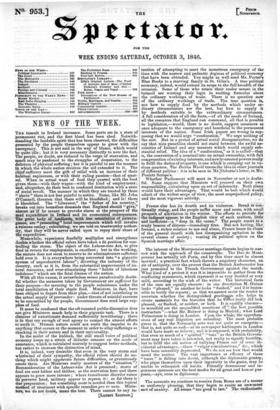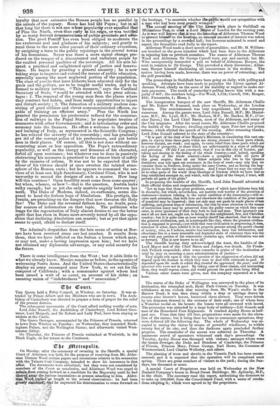The accounts we continue to receive from Rome are of
a tensor 5o uniformly pleasing, that they begin to excite an unwonted sort of anxiety. AR seems "too good to last." The enthusiastic
loyalty that now animates the Roman people has no parallel in the annals of the papacy. Rome has had 261 Popes ; but in all that long list there is not one whose popularity ever equalled that of Pius the Ninth, even thus early in his reign, or was testified by so many fervent demonstrations of public gratitude and affec- tion. The good Pontiff has even been obliged to moderate the too exuberant zeal and gladness of his subjects ; and gently to recal them to the more sober pursuit of their ordinary avocations, by assigning a term to the public rejoicings in the several towns of his dominions. Never was there a more signal change pro- duced on the temper of a discontented and turbulent people by the exalted personal qualities of the sovereign. All his acts be- speak a practical and enlightened spirit of justice and benevo- lence. He began by granting a general amnesty ; he is now taking steps to improve and extend the means of public education, especially among the most neglected portion of the population. The class of youths that have hitherto been educated only for the gaols and the galleys, are to be taught useful trades, and to be formed to military service. "This measure," says the Cardinal Secretary of State, "would be attended with two great advan- tages: 1. The removal of the young men from the places where they contract bad habits, and from ready opportunities to injure and disturb society ; 2. The formation of a military nucleus con- sisting of good soldiers and clever noncommissioned officers, ca- pable of training an efficient army." Pius the Ninth has granted the permission his predecessor refused for the construc- tion of railways in the Papal States ; be negotiates treaties of commerce with other Governments ; and is introducing order and economy into the finances. He offers a welcome to the genius and learning of Italy, as represented in the Scientific Congress ; he has relaxed the severity of the censorship ; and has gradually got rid of the corrupt police of his predecessors, and put better men in their places. Of course, all this is not done without en- countering more or less opposition. The Pope's extraordinary popularity, as well as the energy and firmness of his character, forbid all open resistance ; but whatever can be done in passively obstructing his measures is practised to the utmost limit of safety by the enemies of reform. It was not to be expected that the odour of his virtues should at once sweeten the tainted atmo- sphere of the Roman curia ; but he appears to command the ser- vices of at least one high functionary, Cardinal Gizzi, who is not unworthy to second the designs of such a master. How long *ill this continue ? Open hostility must come from some quarter; but when, whence, or how 1—that is the question. Austria looks sulky enough ; but as yet she only mutters angrily between her teeth. The Duke of Modena, indeed, ex-carbonaro, seems dis- posed to head the forlorn hope of Absolutism. His proteges, the Jesuits, are preaching on the clangers that now threaten the Holy See! The Duke and the reverend fathers have, no doubt, pecu- liar sources of information on that topic. The politician who longs for the regeneration of Italy almost desires to see the better spirit that has risen in Rome more severely tested by all the oppo- sition that declining Absolutism can muster; but as yet that spirit seems to quail, afraid to declare itself.



























